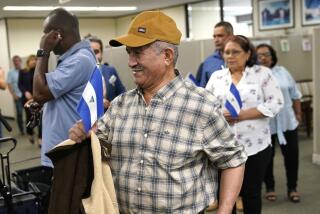U.S. Lowers Its Contra Goals; Collapse Feared
- Share via
WASHINGTON — The Reagan Administration, increasingly convinced that the Contras are losing the war in Nicaragua, has quietly scaled down its goal to merely preserving a few thousand of the guerrillas in the field so that the next President can revive their insurrection, U.S. officials said this week.
“It is a disaster,” a senior State Department official said. “There is no other word for it.”
As recently as the beginning of this year, when the United States was still supplying the Contras with military aid, Administration officials still hoped that the rebels could grow into a force of 30,000 or more that would seriously threaten the Marxist Sandinista regime.
Bitter Internal Dissension
But officials said they now expect most of the existing 12,000-man rebel force to collapse within six months, victim of a cutoff in U.S. military aid, bitter internal dissension and the military and political skill of the Sandinista government it sought to overthrow.
“They’re folding rather dramatically,” an intelligence official said.
As a result, officials said, the U.S. objective has been reduced to maintaining from 2,000 to 4,000 Contras in the field--less than one-third of the present force--”to keep the next Administration’s options open,” a senior State Department official said.
“What we want to do is to keep an armed entity together somehow, on the field and in the headlines, until the next Administration,” a senior Defense Department official agreed. “It is a defeat. You’ve got to admit it. But it is not total annihilation.”
In public, Administration officials have put a more resolute face on the situation, insisting that they still hope to win renewed military aid for the rebels from Congress this year.
“The odds are against the resumption of military aid,” Assistant Secretary of State Elliott Abrams said Friday. “But it’s not at all impossible, and we’re going to try.”
But other senior officials from several agencies who have helped run the Administration’s Contra policy said that they see little chance of renewed military aid during this election year. Instead, said these officials, who insisted that they not be named, President Reagan’s long personal crusade to support the Nicaraguan guerrillas is heading toward an ignominious end.
Some officials have begun blaming each other for the disintegration of the policy. Several State Department aides charged that the CIA has been working with unseemly haste to extricate itself from the battlefield.
“The agency is striking its tents,” one official said. “The problem is, we’re still in them.”
A CIA spokesman, asked to respond to the charge, said only, “Our job is to implement policy, not to set it.”
Contras Streaming North
Since Congress’ rejection of further military aid last Feb. 3 and the signing of a cease-fire by the Sandinistas and the Contras on March 23, Contra troops have streamed north out of Nicaragua to camps in Honduras, officials said.
U.S. intelligence now estimates that of the 12,000 remaining Contras, as many as 9,000 may be in Honduras, where they can receive U.S.-supplied food and clothing. That would leave as few as 3,000 in Nicaragua.
The long and inconclusive negotiations with the Sandinistas over a permanent truce have created deep divisions in the Contra ranks, culminating in an abortive revolt by several military commanders and a struggle for power between the movement’s top two leaders, Adolfo Calero and Enrique Bermudez.
Public Relations Gains
Meanwhile, the Sandinistas have gained the upper hand in the public relations battle, appearing to be devoted to the cause of a negotiated peace. Although the Contras and the Administration charge that the Nicaraguan regime has stepped up its repression of domestic opponents since the cease-fire, the Contras have failed to capitalize on those charges.
In a new round of negotiations in Managua this week, the Contras initially rejected a Sandinista offer to extend the current cease-fire, which is scheduled to end Monday, and said that they wanted to discuss proposals for democratic political reform instead.
In meetings earlier this week, Administration officials told the Contras that they will lose even more support in Congress if they appear to stand in the way of a continued cease-fire.
Nevertheless, both U.S. and Contra officials agree that the current truce is benefiting the Sandinistas because the Nicaraguan government has refused to allow the United States to deliver aid to rebel units inside the country, thus forcing many of the Contras to retreat to Honduras.
Can’t Force Regime Out
They also said they do not believe any permanent peace agreement signed under the current circumstances--with the Sandinistas clearly militarily superior to the Contras--can meet the Administration’s original goal of forcing the leftist regime to give up power.
“The negotiations aren’t working, if what you mean by working is producing a democracy,” the Defense Department official said. “They might work in lesser ways, as far as setting up cease-fire zones (where the Contras can circulate freely inside Nicaragua) and getting humanitarian assistance inside the country.”
As a consequence, he said, the Administration supports the current negotiations between the Contras and the Sandinistas only as a short-term tactic to help the rebels stay alive, not as a way to end the war.
“Nobody’s going to talk the Sandinistas into changing,” he said.
Hope to Keep Nucleus
If the Administration can succeed in keeping a nucleus of 2,000 to 4,000 Contras in the field, he added, the rebels can continue to put at least some pressure on the Sandinistas--and over the long run, could wear the regime down.
“Those 2,000 hard-core guys could keep some pressure on the Nicaraguan government, force them to use their economic resources for the military and prevent them from solving their economic problems--and that’s a plus,” he said. “Anything that puts pressure on the Sandinista regime, calls attention to the lack of democracy and prevents the Sandinistas from solving their economic problems is a plus.”
But other officials, particularly in the State Department, said the idea of supporting a smaller Contra force is little more than an improvised stopgap--and may itself be impossible to achieve.
“By itself, supporting a couple of thousand Contras isn’t going to improve the basic situation,” one said. “The basic situation won’t improve until we get engaged in the negotiations that are already under way.”
The waning prospects for U.S. military aid will also make it difficult to keep the force together, another official said.
Appearance of Collapse
“The appearance of American collapse is too great,” he said. “To keep the Contras together, you have to have a goal beyond keeping the Contras together.”
So far, President Reagan has rejected direct U.S.-Nicaraguan negotiations. But several officials have been urging Secretary of State George P. Shultz to propose a new U.S. negotiating effort as a way to acquire more leverage in Central America.
Moreover, the Administration has run into problems supplying the Contras. Congress approved $17.7 million in non-military aid for them in March, but supplies under the program are being delivered only in Honduras. The fourth consignment of the aid arrived in Tegucigalpa on Friday aboard four C-130 transport planes, wire reports said.
The Sandinistas have offered to allow the International Red Cross to deliver aid within Nicaragua, but the Administration has rejected that offer.
Meanwhile, Congress has required such strict control over the aid that when the Contras received a shipment of about 7,000 bananas and plantains, a starchy fruit that is a staple in Caribbean countries, each bunch was passed through a metal detector to check for weapons.
“We may not be capable of keeping 2,000 troops in the field,” one official said. “We may end up simply trying to avoid having to airlift them all to Florida.”
Times staff writer Richard Boudreaux, in Managua, contributed to this story.
More to Read
Sign up for Essential California
The most important California stories and recommendations in your inbox every morning.
You may occasionally receive promotional content from the Los Angeles Times.














